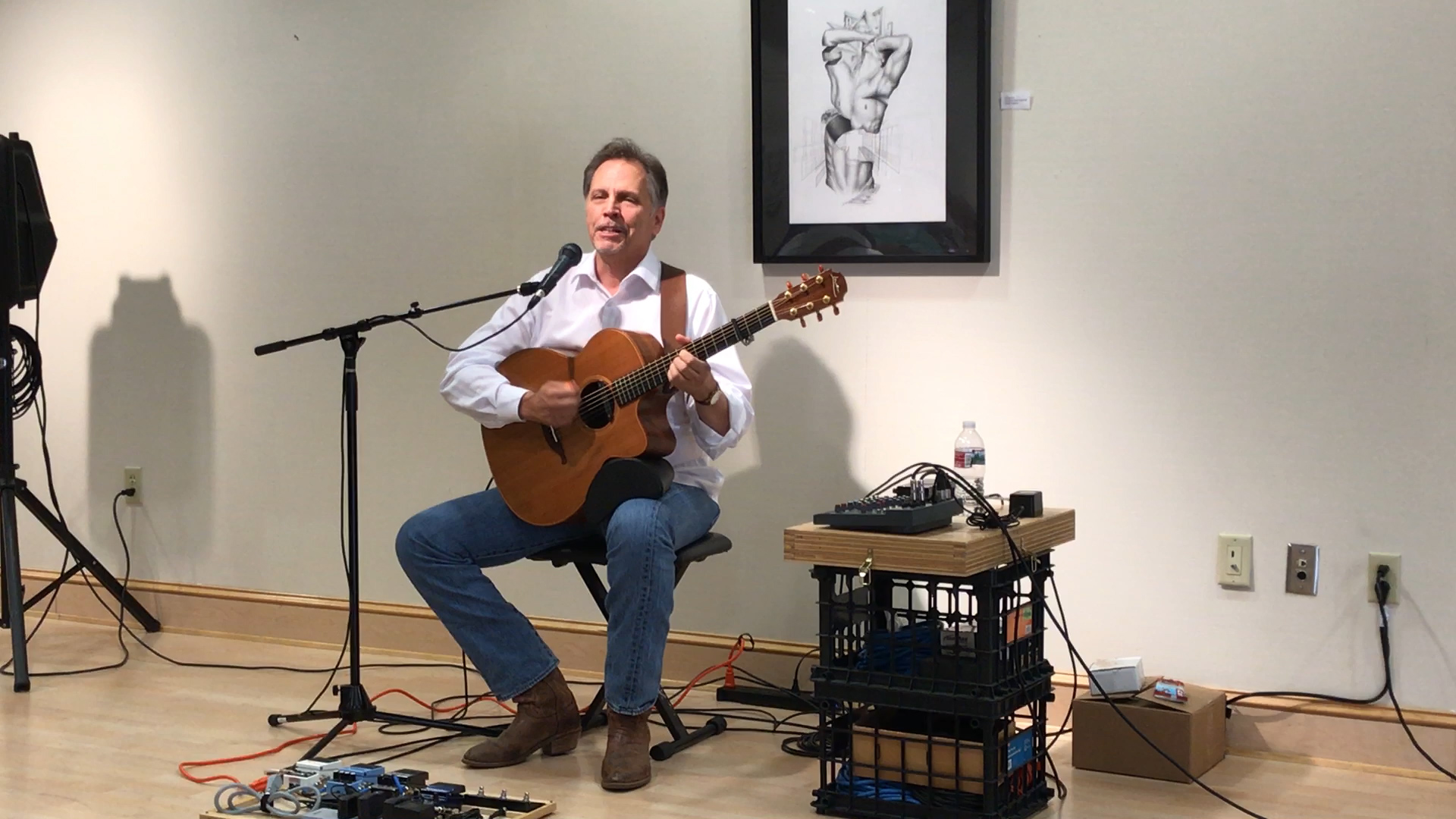By CRISTINA JANNEY
Hays Post
Celtic guitarist Jerry Barlow came to Hays on Saturday in hopes of changing some hearts.
Barlow, 67, of Golden Colorado began playing music when he was a teen and won a little money at church bingo, enough to buy a guitar. He played country music in his early days and had a song picked up by Conway Twitty.
He discovered Celtic music when he moved into the Smoky Mountains around Gatlinburg, Tennessee.
“So much of it has a primal quality, at least for me. It goes to the core of humanity,” he said. “A lot of it was born out of suffering, which gives it a lot of depth. I love the stories and all the histories and the legends behind that stuff as well.”
He did not know at that time if he had any Celtic blood. He later learned through genealogical research with the help of a friend he was part English and part Scottish on his father’s side.
“I would go to Irish jam sessions a lot and play. I would encounter a little attitude about my Englishness. It is strange though because the English are just as Celtic as the Irish and the Scots. It is built on a Celtic foundation, but the English were so cruel to the Irish and the Scots. It was hard to realize they were all Celtic, but they were. The way they subjugated the Irish and the Scots, it was just so brutal. It is hard to believe people who are brothers could do that to one another.”
Barlow worked on a project called Journeys, which highlighted how people immigrated to the United States over the last 150 years. The exhibit was going to museums and libraries, and Barlow performed at stops along the exhibit’s tour. He wrote songs for this tour that included “Voyage of Hope,” and “Crumbs for Crust,” which he performs with “Praties.”
Praties is an Irish word for potatoes and originates from the mid-1800s when the potato famine in Ireland drove hundreds of thousands of Irish to flee their home country for the United States.
Two-fifths of the Ireland’s population relied solely on the potato crop for their livelihood. The famine resulted in 1 million death and millions more emigrating from the country. Many Irish found hardship when they arrived in the States. White, protestants refused to employ the Irish immigrants, hanging signs in their windows that said, “Irish need not apply.”
Some Irish immigrants no sooner arrived in the U.S. when their were pressed into service to fight for the Union Army during the Civil War.
“The big thing, and I think this is why they came up with the Journeys project, is that immigration is such a hot-button topic,” he said. “You realize whoever comes over, the newest arrival, is going to be the lowest on the totem pole, and there is going to be bias and all that stuff. The Irish were just thought of as the scum of the earth. They were the lowest of the low for some time until they worked their way up. We tend to do that as human beings to the new arrivals until they make their way into American society.
“So much of what I saw visited upon them is what I see visited upon Hispanic and Middle Eastern populations now, but it is the same kind of stuff that the Irish were dealing with.”
Barlow encouraged the audience to join him in a round of “Waltzing Matilda,” whose tune is based on an old Celtic folk song. Barlow related the tale behind the song which is about a man wandering or “waltzing” around the Outback with his bag of possessions called Matilda. The man kills a stray sheep, and the wealthy landowner and mounted police pursue him. He jumps in the billabong or water hole and drowns himself rather than be captured. He haunts the billabong forever after.
Barlow admitted many of the Celtic folk songs are about oppression and tragedy and he tries to interject pieces that are a little more upbeat along with some of the classic ballads.
“My highest and best hope is that I will be able to give joy, healing, love and uplifting to an audience,” he said. “In a room full of 30 people, not everyone is going to have the experience. You hope for the people who are supposed to get it.”
Barlow plays acoustic versions of more modern songs from groups like the Beatles. Although bands like the Beatles and the Rolling Stones are not Celtic, Barlow said he can see some of the Celtic influences in their music. Drones on rock ‘n’ roll guitars are similar to the sound of bag pipes.
Barlow has performed in Hays before. During the concert at the library Saturday, a woman in the audience requested a song he had written, “Keepsake.” Barlow wrote the song after his parents died. At the time the woman first heard the song, she had just lost her teenage son. She told him she has been listening to that song over and over almost daily since his performance in 2010.
“She played it today before she came,” he said. “That is what I hope—that the music has some therapeutic value to people. I realize that won’t happen for everybody that walks through the door. It doesn’t happen that way for any performer, but you just trust that it reaches who it’s supposed to. I just happen to hit someone who was going through that. That song did what I wanted it to do.”
You can learn more about Barlow and his music, including purchasing CDs, by going to his website.
